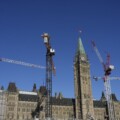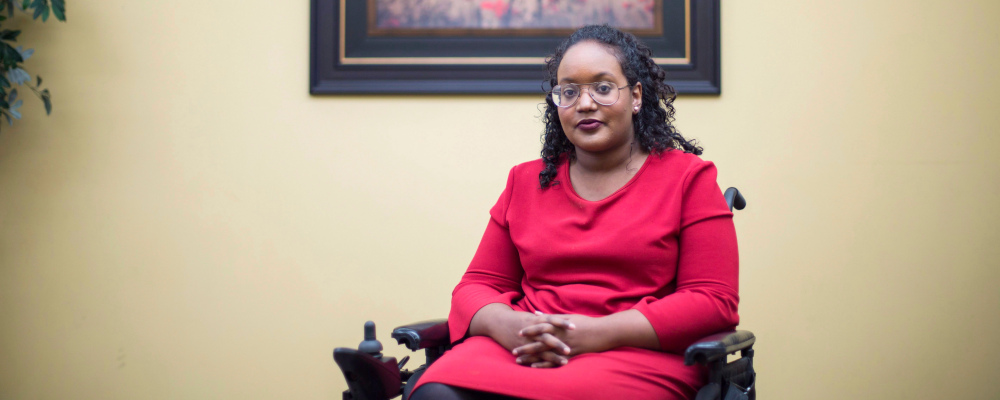Is there anything more Canadian than the fact that a Member of Provincial Parliament who issued a statement after a barbaric massacre of innocents in Israel, in which she (checks notes) neglected to mention the atrocity at all, criticized Israel, and edified the violence as justified retaliation, was kicked out of caucus by her party not for completely lacking a moral compass but for contributing to an “unsafe work environment” and undermining “collective work”?
To recap: on October 10, as the world was still reeling from images of bleeding and brutally murdered Jewish babies, grandmothers, and young women, the now former NDP MPP for Hamilton Centre Sarah Jama took to X to respond. Jama stated that she was “reflecting on her role as a politician participating in this settler colonial system.” She accused Israel of apartheid, using chemical warfare against Gazans, and referred to “retaliation rooted in settler colonialism.”
Jama is 29, but she still has the fervour and guilelessness of an even younger university activist. Earlier this year after winning a byelection in Hamilton Centre, she apologized after retweeting a post calling an Islamic Jihad terrorist a “martyr.” I know her type well: watching the likes of Jama contort language to justify the suicide bombings of pizza parlours and buses during the Second Intifada was a canon event for me as a McGill undergraduate which profoundly shaped my worldview.
On October 18, Ontario legislative house speaker Paul Calandra moved to censure Jama’s “disreputable conduct” and authorize the speaker not to recognize her until she retracted and deleted her comments and apologized in the house. In response, Jama apologized—and then pinned her original statement to the top of her X profile, an act perceived by many in Queen’s Park as defiant. She also sent a cease-and-desist letter to Doug Ford accusing him of libel.
That brings us to this week, when NDP leader Marit Stiles finally announced that she would eject Jama from caucus for the aforementioned “unsafe work environment” and the undermining of “collective work.” In the same session, the PC party supported the censure motion, which would prevent the Speaker from recognizing Jama until she apologizes publicly and on screen. The NDP dissented; the Liberal Party abstained. The vote count was 63 to 23.
While it seems commonsensical that a parliamentary motion preventing an elected member from speaking, and even compelling her public apology as a condition precedent for doing so, carries free speech implications, the reality is more complicated. The idiosyncrasies of parliamentary privilege—a doctrine developed as a hedge against authoritarianism—mean that while Jama may have a moral claim that her right to free speech has been violated, she has no such legal claim.
Parliamentary privilege is the idea that legislators bear inherent privileges, which courts cannot review or interfere with. Parliamentary privilege covers an expansive swath of activity, including the power of legislatures to regulate their own internal affairs and the power to discipline their members as they see fit.
As Justice Fregeau noted in Alford v Canada, a 2022 case brought by law professor Ryan Alford challenging provisions of a federal act for encroaching on parliamentary privilege:
[t]he effect of a matter falling within the scope of parliamentary privilege is that its exercise cannot be reviewed by any external body, including a court…parliamentary privilege recognizes Parliament’s exclusive jurisdiction to deal with complaints within its privileged sphere of activity, thus providing immunity from judicial review.
This means neither Jama’s statements nor her colleagues’ chosen actions in addressing them could be challenged in a court.
Another recent example of the bright line of parliamentary privilege shielding a legislator’s actions from judicial review was Ontario Premier Doug Ford’s 2022 refusal to testify after being summoned to give evidence at the Public Order Emergency Commission, despite almost certainly possessing relevant evidence about the response to the Ottawa convoy protests. Whatever the political consequences, the court decided that as a sitting member of the legislature, his decision was immunized from judicial review while the legislature was in session.
Parliamentary privilege historically evolved as a shield against the improper meddling of the executive—in particular, zealous kings and queens. For example, in 1629, King Charles I ordered two parliamentarians imprisoned for alleged seditious statements made in Parliament. Parliamentary privilege evolved in response to executive overreaches like this because for Parliament to effectively act as a prophylactic against totalitarian rulers, parliamentarians had to be free to speak their minds without fear of reprisal from the Crown.

These rules appear to jostle uncomfortably with the (correct) proposition that the Constitution is the supreme law of Canada. However, Parliamentary privilege and Charter rights including the right to freedom of expression are both parts of the constitution. In Nova Scotia v. New Brunswick Broadcasting, where journalists challenged a ban on video cameras in the legislature as a violation of their free expression rights, Justice McLachlin explained that it is a “basic rule” that one part of the Constitution cannot be abrogated or diminished by another part of the Constitution (and thus the legislature’s decision to forbid recording could not be reviewed by a court).
Though all Canadians enjoy the right to not have our speech censored directly or indirectly by government action, this doesn’t mean parliamentarians can’t be subject to discipline from the legislature or their party. Bluntly, the right to free speech does not equal a right to speak in a session of the legislature.
Legality aside, even if the legislature has full purview to censure Jama by way of motion, that doesn’t mean they ought to. Silencing Jama is likely to render her a heroine for progressives and provoke sympathy that she doesn’t deserve. The optics of a young Black woman made the whipping girl of Queen’s Park by its old, white, ham-fisted leader Doug Ford are not good. Instead, Queen’s Park should let Jama continue to spout her apparent apologias for terror and let voters express their disapproval of them at the next election.
Recommended for You

The Notebook by Theo Argitis: Carney’s One Big Beautiful Tax Cut, and fresh budget lessons from the U.K.

Christopher Snook: Is Canada sleepwalking into dystopia?

Rudyard Griffiths and Sean Speer: The fiscal hangover from the One Big Beautiful Bill hits Canada

‘A fiscal headache for Mark Carney’: The Roundtable on how Trump’s One Big Beautiful Bill could affect Canada




